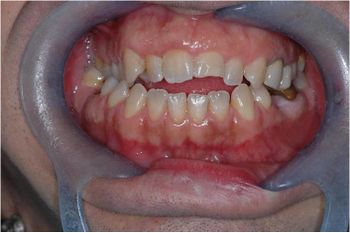Difference between revisions of "'Introduction'"
| Line 25: | Line 25: | ||
<blockquote> | <blockquote> | ||
==[[Strategic dental topics for authors to subscribe an article|<small>Strategic dental topics for authors to subscribe an article in Masticationpedia</small>]]== | ==[[Strategic dental topics for authors to subscribe an article|<small>Strategic dental topics for authors to subscribe an article in Masticationpedia</small>]]== | ||
Scientific Paradigms in Dentistry, Thomas Kuhn Paradigm Shift, Epistemology in Dentistry, Masticatory Rehabilitation, Interdisciplinary Dental Research, Malocclusion Treatment, Complex System Theory in Dentistry, Dental Science Innovations, Metacognitive Scaffolds in Science, Holistic Dental Care, Dental Anomalies and Solutions, Scientific Progress in Dentistry, Dental Paradigm Shifts, Dentistry and Epistemological Shifts</blockquote> | <small>Scientific Paradigms in Dentistry, Thomas Kuhn Paradigm Shift, Epistemology in Dentistry, Masticatory Rehabilitation, Interdisciplinary Dental Research, Malocclusion Treatment, Complex System Theory in Dentistry, Dental Science Innovations, Metacognitive Scaffolds in Science, Holistic Dental Care, Dental Anomalies and Solutions, Scientific Progress in Dentistry, Dental Paradigm Shifts, Dentistry and Epistemological Shifts</small></blockquote> | ||
{{Bib}} | {{Bib}} | ||
Revision as of 20:17, 6 May 2024
'Introduction'
Abstract
"Masticationpedia" provides an in-depth analysis of paradigm shifts in the realm of dentistry and masticatory rehabilitation, rooted in Thomas Kuhn's seminal theories on scientific revolutions. According to Kuhn, scientific progress is not linear but is marked by episodic paradigm shifts that disrupt normal scientific activities and lead to profound changes in prevailing theories and practices. These paradigm shifts are critical junctures where existing anomalies in the normal science become insurmountable, prompting the scientific community to adopt new frameworks that radically alter the conceptual landscape[1].
In the context of dentistry, traditional methodologies have predominantly focused on mechanical aspects such as tooth alignment, largely within the domain of orthodontics. However, "Masticationpedia" proposes a more expansive view, suggesting that effective dental practice must encompass not only the alignment of teeth but also consider the entire masticatory system, including its neurological connections. This holistic approach recognizes the interdependence of dental health on overall bodily systems, necessitating a more integrated approach to diagnosis and treatment[2].
The document introduces the innovative concept of "metacognitive scaffolds." These tools are designed to enhance problem-solving capabilities and facilitate effective communication across various scientific disciplines. Such scaffolds are particularly crucial in the multidisciplinary field of dentistry, where understanding complex dental and facial anomalies requires insights from multiple scientific fields, ranging from neurology to materials science. This interdisciplinary approach is vital for fostering innovation and improving clinical outcomes[3].
Critically, "Masticationpedia" addresses the prevalent overreliance on statistical measures such as the P-value in research, which often fail to capture the complexity and nuances of clinical phenomena. This critique aligns with a broader call for open science, advocating for research practices that are transparent, collaborative, and inclusive. Such principles are essential in dentistry and other medical fields, where the implications of research directly impact patient care and treatment methodologies[4].
"Masticationpedia" advocates for paradigmatic innovation in the understanding of masticatory sciences. It calls for a shift from traditional incremental improvements to a more systemic and integrated approach. This approach not only considers the mechanical aspects of masticatory function but also incorporates the biological and physiological complexities of the human body, thereby enriching the conceptual framework within which dental professionals operate[5].
A critical part of the document is a clinical case study that challenges traditional views on malocclusion. The study argues that to fully understand such conditions, one must adopt a perspective that includes the neuromuscular and systemic interactions within the masticatory system. This broadened view fosters more effective diagnostic and therapeutic strategies, which are illustrated through improved patient outcomes in the case study presented[6].
Moreover, "Masticationpedia" delves into the philosophical and historical dimensions of scientific knowledge, challenging longstanding assumptions and highlighting the dynamic nature of scientific inquiry. It advocates for a scientific approach that is reflective, open, and modest, acknowledging the limitations of current knowledge and the potential for future discoveries[7].
In conclusion, "Masticationpedia" promotes a patient-centered approach in dental health, aiming to position dentistry at the forefront of scientific innovation and patient care. It encourages the integration of broad philosophical insights and advanced technological research to enhance the efficacy and quality of dental treatment[8].
Overall, "Masticationpedia" challenges conventional dental practices and scientific approaches, proposing an integrated model that enhances understanding and treatment of masticatory disorders. It calls for rethinking the foundations of dental science, advocating for a holistic, integrated, and patient-focused approach that embraces the complexities of human health. This vision is supported by a robust critique of traditional methodologies and a call for embracing new, interdisciplinary paradigms that can lead to significant advancements in dental science and patient care.
Strategic dental topics for authors to subscribe an article in Masticationpedia
Scientific Paradigms in Dentistry, Thomas Kuhn Paradigm Shift, Epistemology in Dentistry, Masticatory Rehabilitation, Interdisciplinary Dental Research, Malocclusion Treatment, Complex System Theory in Dentistry, Dental Science Innovations, Metacognitive Scaffolds in Science, Holistic Dental Care, Dental Anomalies and Solutions, Scientific Progress in Dentistry, Dental Paradigm Shifts, Dentistry and Epistemological Shifts
- ↑ Kuhn Thomas S, «The Structure of Scientific Revolutions», University of Chicago Press, 2012, Chicago».
ISBN: 9780226458120 - ↑ Proffit William R, «Contemporary Orthodontics», Elsevier, 2019, St. Louis».
ISBN: 9780323543873 - ↑ Ackerman Michael B, «Interdisciplinary Dentofacial Therapy: A Comprehensive Approach to Optimal Patient Care», Quintessence Publishing, 1995, Chicago».
ISBN: 9780867153081 - ↑ Wasserstein Ronald L, «Moving to a World Beyond "p < 0.05"», in Am Stat, 2019».
DOI:10.1080/00031305.2019.1583913 - ↑ Turpin David L, «Paradigm Shifts in Orthodontic Treatment», in Journal of Orthodontics, 2002 – in «Vol. 29».
DOI:10.1093/ortho/29.1.8 - ↑ Smith Paul A, «Malocclusion and its effects on the masticatory system», in Dental Update, 2018 – in «Vol. 45», pp. 25-36.
DOI:10.12968/denu.2018.45.1.25 - ↑ Curd Martin, «Philosophy of Science: The Central Issues», W.W. Norton & Company, 1998, New York».
ISBN: 9780393971750 - ↑ Feine Jocelyne S, «The Role of the Dentist in Modern Health Care», in Journal of Dental Education, 2009 – in «Vol. 73», pp. 1183-1191.
particularly focusing on the field of the neurophysiology of the masticatory system
